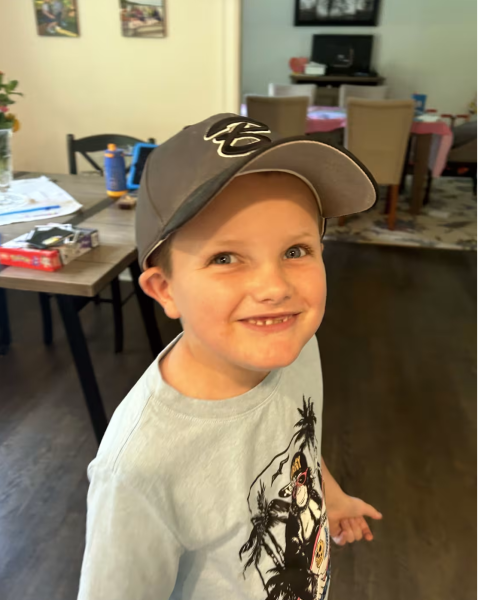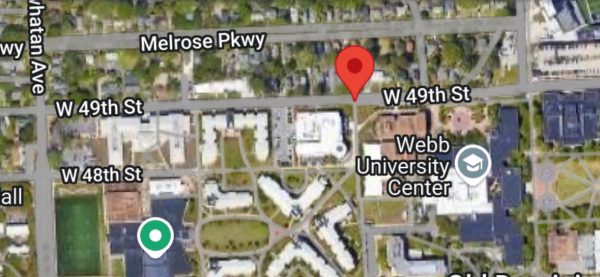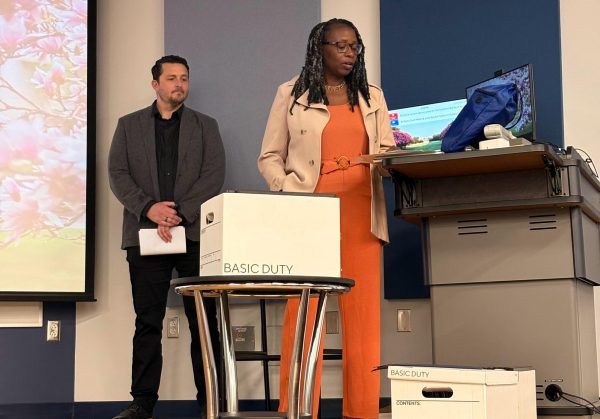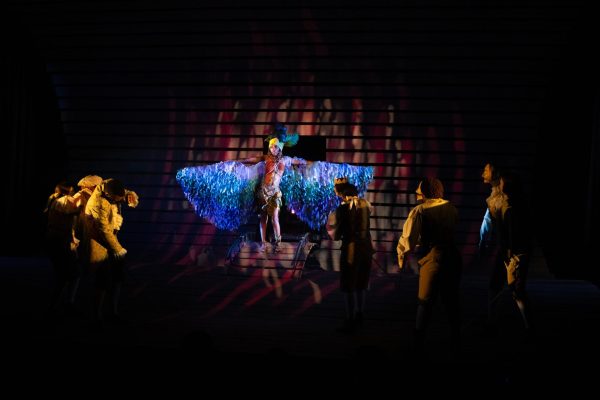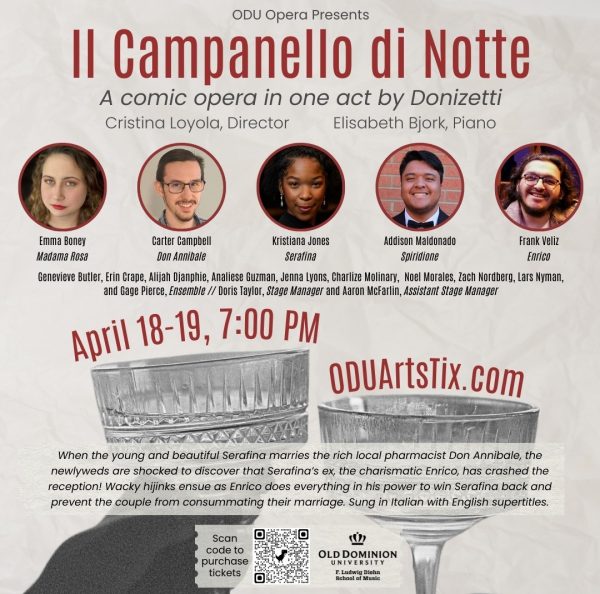ODU’s Struggle with Academic Freedom Casts a Long, Dark Shadow
Controversy over the university’s mishandling of Dr. Allyn Walker’s research and the subsequent media attention raises concerns about academic freedom and the role higher education plays in addressing sensitive research topics.
This article first appeared in the spring 2022 Mace & Crown magazine issue.
“Old Dominion University doesn’t care about survivors,” says English professor Dr. Alison Reed.
The faculty was disgruntled to begin with. Accusations that visiting professor Blake Bailey sexually harassed students and faculty had been a long-term source of contention, and had recently been brought up in 2021, after years of concerns being dismissed. And then: Dr. Allyn Walker. Only four months after their book was published, Walker, an assistant professor in the sociology and criminal justice department, was placed on academic leave until the end of their contract.
Their book, titled “A Long Dark Shadow: Minor-Attracted People and Their Pursuit of Dignity” built on research Walker conducted during their dissertation, which ODU was fully aware of when Walker was hired. The university was also equally aware of the field of research that they were studying. Walker received intramural funding from Old Dominion University to support their research, through an anonymous grant review process that extended beyond the criminal justice and sociology department and was approved by colleagues in other departments.
Walker took extra steps to make sure the university was informed of the content in their book, and on May 20, 2021, had the interim dean of the College of Arts and Letters share a detailed memo outlining how their book could be misconstrued, as well as talking points to refute any misconceptions. The memo was shared with four high ranking members of ODU administrative staff (as well as the local police chief), including President John Broderick and Giovanna Genard, who is the assistant vice president for public relations.
“Due to my focus on stigma and societal misunderstandings about minor-attracted people, it is possible that the general public will believe that instead of arguing against stigma toward people who share these attractions, I am attempting to “normalize” sexual activity between adults and minors,” Walker wrote in the memo. “I am not.”
Dr. Walker is not the only person in academia studying pedophilia. However, they were uniquely vulnerable because they are queer and trans, unlike the many other professionals in the field.
“Dr. Walker didn’t invent the term ‘MAP’,” said sociology and criminal justice professor Dr. Ruth Triplett, a colleague of Walker. “They’re not the first ones [sic] to research on this. In fact, there’s three or four dozen researchers across the country who are researching and publishing in this area. … I keep going back to ‘if there is other research in this area, why is it that Dr. Walker’s research was attacked with such vehemence?’ And I cannot, I personally cannot separate it from their identity.”
4W is a patreon-funded website representing themselves as “feminists bravely stepping outside the liberal main” that focuses on gender identity and male violence. A particular focus of their work is writing about sexual violence and trans people, largely in ways that illustrate all trans people as sexual offenders, murderers, or pedophiles.
On November 10, 2021, 4W posted an article titled” “Non-Binary” University Instructor Calls To ‘Destigmatize’ Pedophilia”.
Throughout the text Walker is intentionally misgendered; the author refers to them using “she” pronouns instead of the preferred “they”. 4W also directly equates the beliefs of various programs Walker mentions to Walker’s personal beliefs, and misrepresents their research as primarily out of “consideration for pedophile’s [sic] feelings”. 4W was the first platform to cover Walker’s Prostasia interview, which occurred more than four months after their book was published.
Dr. Amanda Peterson, an assistant professor in the sociology and criminal justice department at ODU, identified 4W as being the primary reason for the surge in media attention around Walker’s work.
“The next batch of websites [to pick up the story] were websites with … similar political goals, or alt-right news websites that then picked up the story based on what they saw in this article. So there’s a question of: would anybody have even noticed, would our student body population have even found out about Dr. Walker’s research?” They asked. “The root of the problem here is the transphobia. This kicked off everything.”
How would this story have played out if Walker had been cis?
“We know, because there are dozens of other researchers who work on this topic who have never gotten anywhere near this much attention,” said Peterson. “And they’re cis. Not all of them, but many of them are older, as in middle-age or above. And those researchers sometimes get hate mail. People talk about them negatively online. But there’s been nowhere near the amount of attention that Dr. Walker’s research has gotten, and, in fact, all those people still have their jobs. ”
At the beginning of Walker’s career in social work, they worked as a counselor for victims of sexual assault, which motivated them to study child sexual abuse prevention.
“Some of my clients were children; some others were adults who had been victimized when they were young. I would leave work at night enraged by what I had heard during the day, wishing I could do something more for my clients, wishing more than anything that I could have prevented their victimization,” Walker said in their book.
“It was both heartbreaking and infuriating to hear about peoples’ experiences with sexual victimization in that capacity,” Walker stressed in the Prostasia interview that 4W wrote about. “All I really wanted to do was protect them from the pain they were experiencing.”
Walker’s research is not about excusing child sexual assault, or condoning it. Instead, they’re trying to prevent it, by exploring preventative strategies and methods that begin with the behavior of adults, rather than placing responsibility on victims to report.
Within their book, Walker works to defuse a common misconception: that all people who are attracted to children, physically assault children.
“A lot of people, when they hear the term pedophile, they automatically assume that it means a sex offender,” said Walker in the Prostasia interview. “And that isn’t true.”
All of the people that Walker interviewed were non-offending MAPs who had developed coping strategies for their attractions, and help-seeking options, in the event that help would be necessary to prevent themselves from committing a crime. None of them had ever harmed a child. They maintained that hurting a child was the worst thing they could do and they wanted to be good people.
“Not only did they believe that sexual offending against children was wrong, but they also believed that the attractions they experienced were wrong as well,” detailed Walker.
Walker says one of their goals in writing the book was to differentiate between MAPs, or minor-attracted people, and sexual offenders, because the terms are not interchangeable, despite the common misconception.
“It has been my goal… to reaffirm that attractions are not equivalent to action,” they said. “The primary goal of this book is to explore ways of thinking about MAPs that may better protect children from harm.”
Their research functions on one main premise: that sexual abuse of children can and should be prevented.
As it stands, the burden of protecting children from sexual abuse has been placed upon children themselves, Walker writes. They are taught about the power of saying no, and how to get help if they have been hurt or touched, particularly in the popular “The Protect Yourself Rules”, which are taught from kindergarten to grade six.
“The goal of the media such as “The Protect Yourself Rules” – preventing sexual abuse against children – is undoubtedly important,” wrote Walker.
“However, I invite you to examine this type of programming with me. We live in a society in which we teach young children about saying “no” to adults as a policy for preventing abuse…We have allowed our ‘sexual abuse prevention’ strategies to place the burden of prevention on potential victims and to focus on intervention after the fact, rather than before it happens. To truly prevent abuse, we need to shift our focus.”
Walker’s research is not theoretical, but peer-reviewed and advocated for in the field of sexual abuse prevention. Their book was published by a highly reputable press in the field of sociology – the University of California Press – and underwent a blind peer review from others in the field before it was published. Their work has also been cited nearly 300 times, according to their Google Scholar metrics.
“Some child abuse organizations who spend all of their time trying to prevent child abuse, they are using this work,” said Triplett. “I do think that in a few years, when this has become more out and [there is] more discussion… that we will regret this as a university. Because this is quality research.”
Walker’s work is being actively applied in preventing child sexual assault. The Zero Abuse Project, an organization dedicated to “transforming institutions in order to effectively prevent, recognize, and respond to child sexual abuse” worked with a church in California, called Menlo Church, to assess their child protection policies in October of 2021. The assessment emphasizes the protection of children by helping remove people who struggle with pedophilic attraction from spaces with children, as well as ways in which the adult in question can help manage their attractions with both mental health and spiritual professionals.
In their report, the Zero Abuse Project references practices from Walker’s research when discussing that adults with sexual attraction to children should not be allowed in youth ministry. On page 153 of their book, Walker documented that many non-offending MAPs self-regulate by avoiding spaces with children.
Walker’s work has also been endorsed by researchers and clinicians nationwide. A letter signed by 63 people was sent to President Brian Hemphill and other high ranking faculty on November 22, 2021, two days before it was announced that Walker would remain on leave until the end of the school year.
“As researchers and clinicians in the fields of sexual abuse prevention, mental health, human sexuality, and criminology, we affirm both our strong stance against the abuse of children and other vulnerable people,” they wrote, “and our strong support for Professor Allyn Walker, their important and ground-breaking research, and their freedom as an academic to explore topics that may spur controversy or discomfort.”
When Walker spoke with their colleague, Dr. Amanda Peterson, on Friday, November 19, they desperately wanted to stay at ODU. They had been placed on administrative leave a few days before, on Tuesday, November 16. When they had been, it was a surprise. Walker was not immediately informed that they had been placed on leave, and the decision occurred after they had taught two classes that morning.
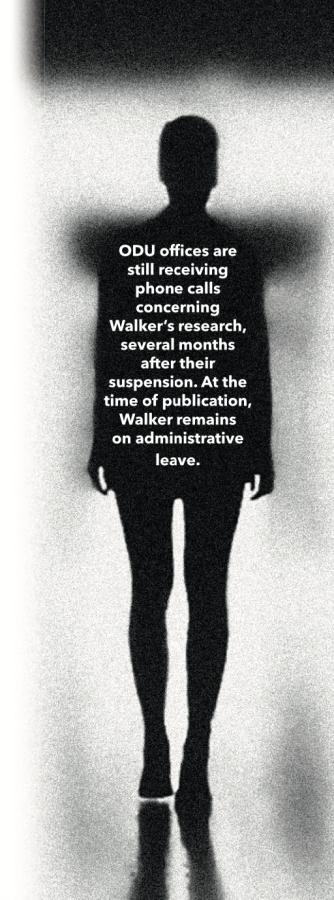
“Up until that point, they did not want to resign,” said Peterson. “They desperately wanted to stay at ODU. They care about our students deeply. They love what they teach here. They love this department.”
“And so whatever happened over the next few days, I’m not privy to that information,” said Peterson. “But knowing how deeply Dr. Walker wanted to stay here, and then by what, the middle of the next week? They had resigned. There are lots of questions about what happened in between those days that it doesn’t seem like we’re going to be able to get the answers to. To the university … it’s a personnel matter, we can’t discuss it. Dr. Walker is just not discussing it.”
After Walker’s research began receiving media attention, they were provided with legal representation by KaiserDillon PLLC through the Foundation for Individual Rights in Education (FIRE).
“By removing Walker from the classroom, Old Dominion capitulated to the loudest, angriest voices and gave hecklers a veto over what faculty can research, publish, or say,” said FIRE about the situation. “The First Amendment rights of free speech and academic freedom protect the ability of public college faculty to explore ideas, no matter how controversial or how many people agree or disagree with them.”
Following the decision to put Walker on temporary leave, President Hemphill announced on November 24, 2021, that Walker would leave ODU at the end of their contract in May.
“We can all agree that we condemn intimidation and threats as in opposition to the ideals of our University and society itself,” Hemphill said. “Especially in an academic environment, controversial ideas should be debated, not silenced.”
Since the announcement shared by Hemphill, Walker has not spoken about the situation, either privately or publicly. Walker also declined to comment for this article.
During the research for this piece, the Mace & Crown filed a Freedom of Information Act (FOIA) asking for information relevant to the situation. Among the documents requested were emails sent by Hemphill that included Walker’s name during the period of time in which ODU was receiving high levels of media attention. Select documents were withheld by ODU due to “Records [being] subject to attorney-client privilege or attorney work product.”
The FOIA request was only partially denied, but none of the information requested by the Mace & Crown was provided.
Many of the faculty members, particularly those close to Walker, believe that they signed a nondisclosure agreement.
“It’s fairly common for government entities to seek nondisclosure agreements in civil rights settlements, but they’re disfavored by the courts and should be disfavored by universities generally,” said Adam Steinbaugh, director of the Individual Rights Defense Program at FIRE. “That’s pointedly true where the underlying issue is whether the university has violated the free speech rights of a faculty member, making it uncomfortably ironic to ask them to agree to a gag order.”
President Hemphill’s decision to place Walker on administrative leave was not one based on pre-existing policy.
“We turned to the faculty handbook for our rights and responsibilities as faculty members and something that’s become really clear is that the faculty handbook doesn’t have policies in place that protect us,” said Peterson. “There’s nothing in the faculty handbook that says, for example, that a faculty member can’t be either placed on administrative leave, or have some other action taken against them, either to protect their safety or the safety of the campus. So what the university did, did not follow a policy, because a policy doesn’t exist.”
On December 3, 2021, ODU’s American Society of University Professors (AAUP) released an open letter in support of Dr. Allyn Walker.
In it, they said: “…We believe Old Dominion leadership could have done much more to resist the power of the misreading of Dr. Walker’s work and protect their work and reputation in their messaging.
“This is especially true since Dr. Walker and their department and college took the time to inform upper administration of potential blowback against their book following publication. The University could have used insights provided by faculty to draw useful distinctions between the value of Dr. Walker’s work, their right to pursue it, and the discomfort and controversy around the topic itself.
“If we as an institution seek to recruit and retain faculty members who engage in research topics and methodologies the general public might resist, then we as faculty, staff, students, and administration need to work together to ensure that faculty are fairly protected from media and public outrage,” ODU’s AAUP continued. “We respect civil dialogue and the mission of our institution to serve the public as a state school, but faculty should not be placed on leave involuntarily or fear non-renewal of their contract because of public misunderstanding of research. The administration should serve as the protective barrier between faculty, their research, and the public; faculty and administration need to work as one body to counter uninformed outrage, mischaracterization, and misled notions of academic freedom.
“Our concerns relate to the administration not adequately advocating for the protections granted to faculty through peer-reviewed research,” said Dr. Daniel Richards, president of ODU’s AAUP. “Dr. Walker’s research fits with the existing scholarship in the field, and the book itself was peer-reviewed by a highly reputable university press. We do not think the university across the board did enough to help educate students and the public about academic freedom, but wanted too quickly for the controversy to subside.”
“Claiming to support academic freedom is different than ensuring faculty keep their jobs when controversy arises,” he continued. “As a result, we have concerns that there is nothing stopping others from sending threats about controversial research across all disciplines and topics to see that faculty are cornered into resignation.”
Dr. Alison Reed, an associate professor in English at ODU, said she wanted to highlight the responsibility of the institution to “protect rather than punish its faculty members.”
“ODU would not have issued such a response had they not been concerned about saving face in the wake of transphobic, homophobic, willfully ignorant viral right-wing media backlash directed at Dr. Walker,” she said. “As the gross mishandling of the Blake Bailey case makes clear, ODU does not care about survivors. Indeed, it is ironic that Dr. Walker, whose research is aimed at reducing harm against minors, is treated worse by ODU than this former faculty member, a cis white man whom numerous minors as well as ODU faculty members have spoken out against for sexual abuse & assault. ODU’s disparate responses signal that the institution is preoccupied with protecting its own self-interest and reputation and is willing to throw some of its faculty members under the bus in order to do so.”
ODU’s response to media attention, as well as their presentation of Walker’s research in communications to the campus, has been controversial. When Hemphill placed Walker on administrative leave, he discussed Walker’s work in a manner that appears to characterize their research as dangerous.
“Many individuals have shared with me the view that the phrase “minor-attracted people” is inappropriate and should not be utilized as a euphemism for behavior that is illegal, morally unacceptable, and profoundly damaging,” said Hemphill. “It is important to call pedophilia what it is. As a father, I am troubled by this narrative and its potential consequences for my children and that of future generations.”
Walker has spoken time and time again regarding the primary goal of their research: harm reduction. This was also emphasized repeatedly in Walker’s memo, shared with members of ODU administration in May, months before Walker’s work drew attention.
Austin Agho, the provost and vice president for academic affairs, emailed faculty in early December amid growing discussions about academic freedom.
“The principle of academic freedom is essential to enable members of the University community to rigorously pursue research wherever it leads, even – perhaps especially – when it involves sensitive and controversial subjects,” he said. “…That freedom of expression is subject to reasonable limitations – what the law often refers to as “time, place and manner” – to ensure it does not intrude on the rights of others, including their right to physical safety.”
But why, faculty have asked, was virtual teaching not considered? And how was Walker’s speech intruding on the rights of others?
Ultimately, Walker’s suspension has resulted in glaring concerns regarding academic freedom.
What protections do faculty have from negative backlash? If the university is more interested in subsiding controversy than protecting faculty and the pursuit of research, how can ODU retain and attract diverse staff? Will ODU put policies in place to protect faculty in the future?
Richards believes that it is vital for ODU administrators to work with faculty, and revise policy to prevent this from happening again.
“We [the AAUP] believe that for a university to thrive, faculty, students, staff, and administration all need to be on the same page in terms of what academic freedom is and how to protect it—and, most importantly, why,” said Richards. “There were other options we feel were in front of the administration other than administrative leave that likely could have been used. The administration, with shared governance through the Faculty Senate, will need to work on refining the policies in place to ensure campus is safe and faculty members keep their jobs. This is vital work that needs to be done.”
ODU offices are still receiving phone calls concerning Walker’s research, several months after their suspension. At the time of publication, Walker remains on administrative leave.
Further documents, as well as page numbers for each book quote referenced, can be found here.
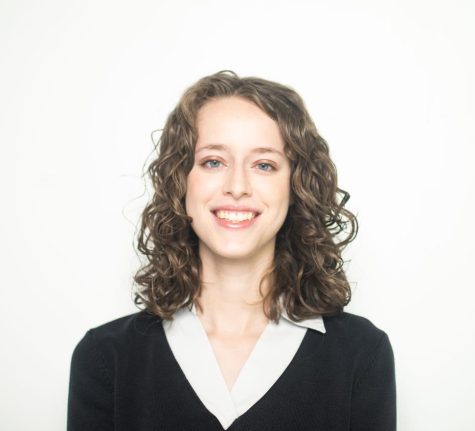
Sydney Haulenbeek is an English major and senior, graduating in May of 2023. Before becoming the Editor in Chief of the Mace & Crown she worked as...
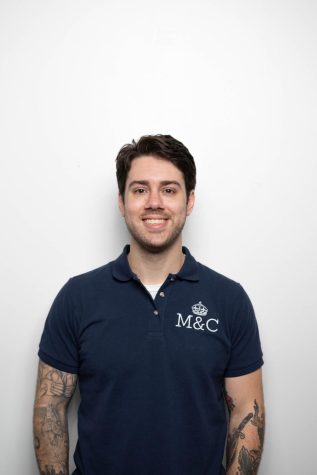
Jonathan Fernandes is majoring in English with a focus on creative writing and journalism. At this time, he serves as the news editor for the Mace and...




